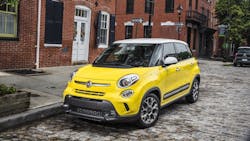Fiat Emissions Face Scrutiny as Germany Escalates Italy Spat
Germany escalated a dispute with Italy over whether Fiat Chrysler Automobiles NV’s vehicles breached emissions rules, asking the European Union to weigh in on its behalf.
The German Transport Ministry wants the EU’s executive arm to intervene in the feud with its Italian counterpart by setting up consultations to find a resolution to disagreements over test results on Fiat cars, according to a letter dated August 30 obtained by Bloomberg News. German magazine WirtschaftsWoche first reported on the letter earlier on September 1.
Germany stepped up scrutiny of auto emissions in the aftermath of Volkswagen AG’s emissions-cheating scandal, including reviewing carmakers outside its jurisdiction.
Under EU rules, Italy is responsible for testing Fiat cars because the automaker’s regional operations are based in the country. Fiat, which declined to comment on the letter, said in May that “all its vehicles comply with emissions regulations and the company doesn’t cheat on emissions tests.”
German Transport Minister Alexander Dobrindt said in May that he doubts Fiat’s cars are in line with rules for emissions certification. Italian Transport Minister Graziano Delrio replied in an interview with Bloomberg a month later that the carmaker’s vehicles were “absolutely fine” and the company showed “maximum transparency.”
Fiat Shares
“We understand that the dialogue between Germany and Italy is ongoing and we will follow developments closely,” said European Commission spokeswoman Lucia Caudet, adding that the Commission has not yet received a formal request to intervene. “It is first and foremost a dialogue between the two member states.”
The auto industry’s credibility has been strained following VW’s admission last September that it rigged diesel-engine software to cheat on official emissions tests. Mitsubishi Motors Corp. has since acknowledged that it manipulated fuel-economy tests, and Daimler AG is checking for possible irregularities in its vehicle certifications at the behest of the U.S. Department of Justice.
The dispute stems chiefly from a loose interpretation of EU regulations that allow automakers to adjust pollution-control systems to protect the engine. Germany has moved to close the loophole and has also strong-armed German-based automakers to voluntarily recall 630,000 vehicles to upgrade emissions systems that turned off exhaust controls at certain temperatures.
By Rainer Buergin and Tommaso Ebhardt
About the Author
Bloomberg
Licensed content from Bloomberg, copyright 2016.
